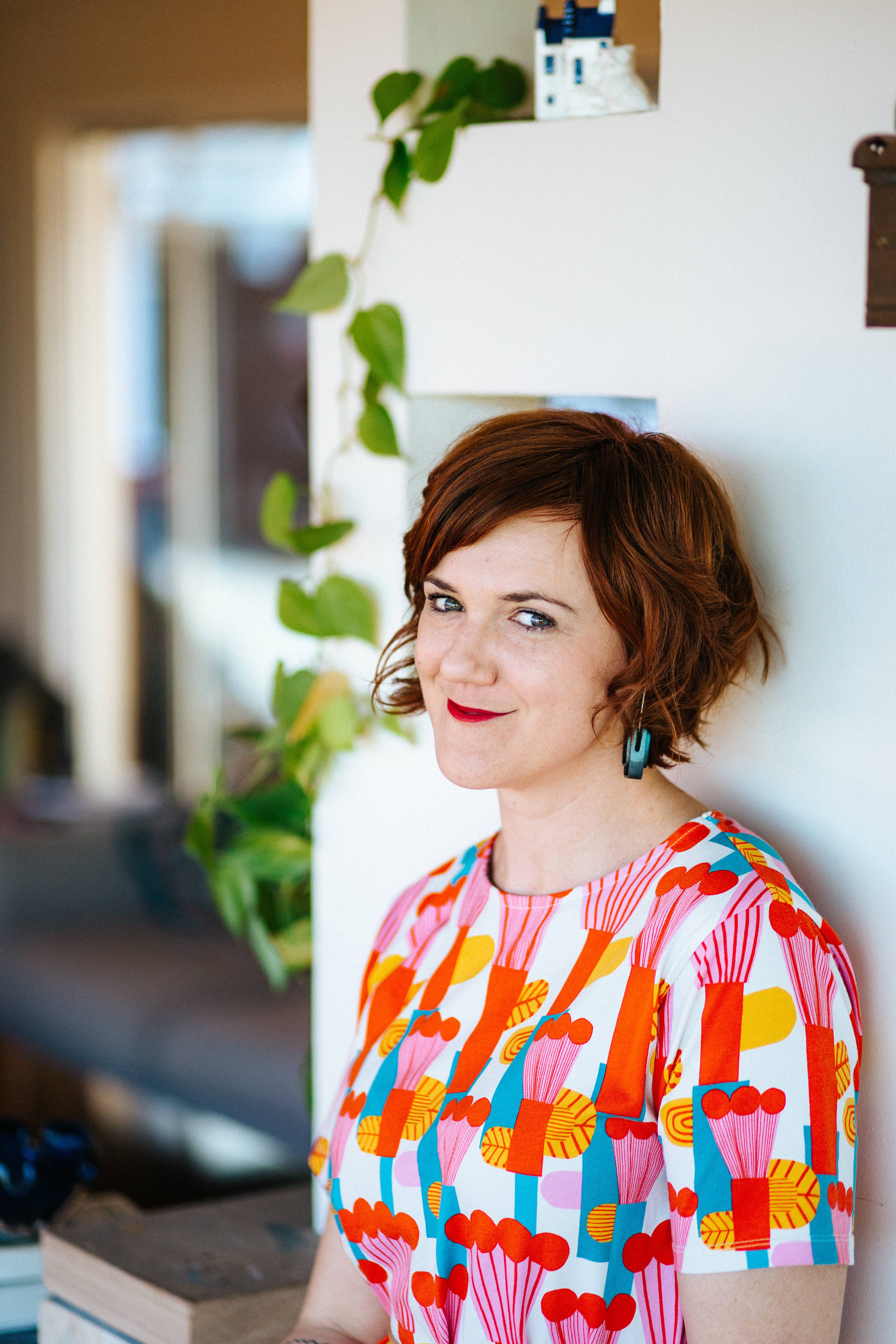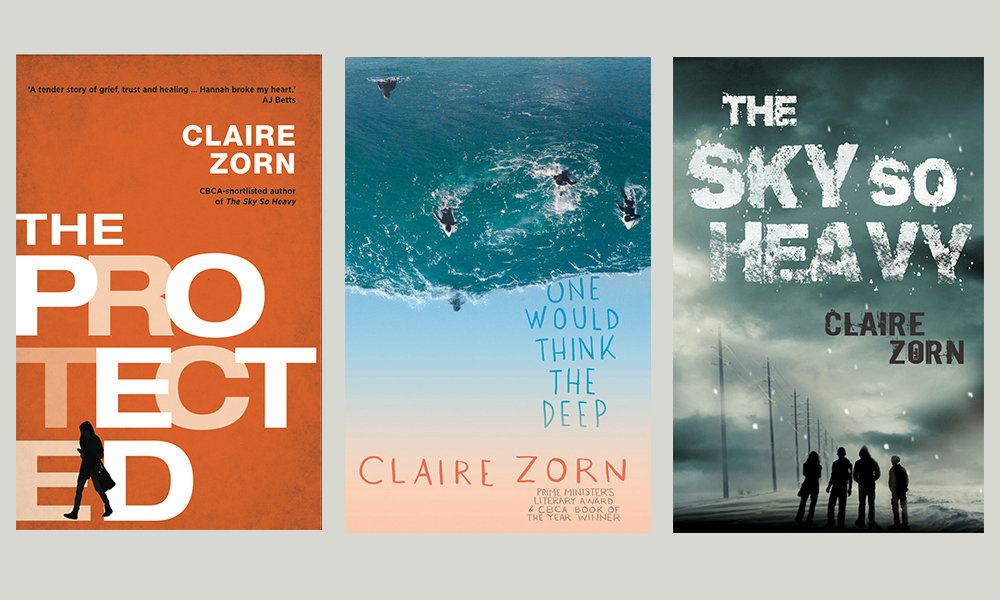When I told a friend and mentor of mine a few years ago that I was struggling to read regularly she asked me what I had been reading. I can’t quite recall the titles, but they were likely all Penguin classics written a century or more ago. This is perhaps a mistake that many English Literature students have made. She encouraged me to unashamedly diversify my reading practice and told me that she often took great pleasure from picking up a children’s book or a novel for young adults. The next day I went to my local bookshop and went home with a YA novel written by Claire Zorn. The YA genre is now a regular and joyful part of my reading practice and I pass along my mentor’s advice when I can. Claire agreed to have a chat to me about her career and her writing.

Claire Zorn is the author of three novels for young adults: The Sky So Heavy, The Protected, and One Would Think the Deep. Published to critical acclaim both nationally and internationally, her novels have won multiple awards, most notably the Prime Minister’s Literary Awards for Young Adult Fiction, the Victorian Premier’s Literary Awards for Young Adult Fiction Prize, the Western Australian Premier’s Book Awards for Young Adult Fiction and the Children’s Book Council of Australia Book of the Year: Older Readers (twice).
¤
JAY ANDERSON: Your young adult and older reader novels — The Sky So Heavy, The Protected, and One Would Think the Deep — have been awarded by prestigious associations including the Prime Minister’s Literary Awards, the Children’s Book Council of Australia, the Victorian Premier’s Literary Awards, and the Western Australian Premier’s Book Awards. What drew you to the young adult form?
CLAIRE ZORN: A few things drew me to write YA. I find teenagers interesting because they have a fresh view of the world and are often underestimated by adults; they are in the process of becoming the person who they will be, and I find that an interesting place to write from. I’ve also always enjoyed writing from a teenage perspective, I don’t really know why, I just find it more fun; maybe it’s because teenagers can be very serious and feel things deeply, but they can also be quite funny and witty. I like that. I also think my style of writing suits YA well; I like to keep things short and sharp. When I’m writing I have a habit of imagining my reader to be terribly impatient and easily bored, for better or worse, and that mindset tends to produce work which suits the genre!
I was definitely an impatient reader when I was a teenager so I think you’re on the mark. I also felt that many of the YA novels I read misconstrued the adolescent experience, but I think you’re adept at exploring the complexities of being that age — of coming into oneself, of hardship, trauma and grief — as well as the fallibility of adults. Can you tell us about your practice and the approach you take to your characters to achieve this?
I don’t approach writing teenage characters any differently to the way I would adult characters because I believe teenagers are just as sophisticated in their processing of the world as adults are, they’re just in a different position in the world. I always conceive the character first before putting them in situations and imagining how they navigate their circumstances. Emotions are the same for adults as they are for teenagers, they’re just expressed differently sometimes. I think the biggest mistake adults make in our thinking and interactions with teenagers is in the way we tend to patronise them. We can be so dismissive. Greta Thunberg isn’t any more articulate or intelligent than most other people her age, the difference is the platform she has been given.
This feeds into recent debates about what YA authors should and shouldn’t include in their novels given the age of their primary audience — namely that young adult readers should be shielded from certain subjects — and plays a role in patronising and dismissing adolescents. It’s probably a part of why they’re often misconstrued in the literature! What are your thoughts on this debate?
This is a very complex one to think about! I don’t think young adults can be or should be shielded from anything, otherwise when life does become messy, which it inevitably does for everyone, they are completely shocked and unprepared. I don’t think there’s anything inappropriate thematically, it’s just a matter of dealing with it in an appropriate way for a young audience. A big key for that lies in hope, I feel. Teenagers need hope even more than the rest of us. As writers we need to show the hard things in life because reading is often a way in which teenagers find comfort and companionship when dealing with crappy stuff. Writing for teenagers needs to be a light for them when they are experiencing hard stuff, an example which says ‘you are not alone, you are not a freak, and you will be okay’, but light is different to sappy and saccharine because they will see straight through that. I try to keep things as realistic as possible without swerving into bleakness. There’s a big difference between difficult and bleak.
It must be quite hard to find a balance to achieve this. I’m curious how religion — which you’ve mentioned is an integral part of your identity — and writing have integrated for you? Both are intimate practices, so how do you bring your faith into the narratives you construct, and manage this given how secular the Australian literary landscape is today?
My reasons for being a writer and being a Christian are exactly the same: I’m always thinking about the world and people and why things are the way they are. It’s a constant thing. My writing is an expression of my constant questions about life and what makes people do the things we do. I’m a Christian because I found all the answers in Christ. I can’t separate my faith from my writing because it colours my view of the world. I believe every person is made in the image of God and needs to be treated that way, this mindset flows into how I think about my characters, particularly more recently in One Would Think the Deep. I try to see them how God would, they are lovingly made but flawed. There are no good people and no bad people, it would be so much easier if that were the case! There are just people who do good and bad things. The Sky So Heavy was the book in which I wrote most explicitly about faith and God because when terrible things happen, we often wonder why any God would allow such a thing and whether or not there is a God at all. The character Noll provided a channel to really dig into those questions. I also wanted to use him as an example to a secular audience of what a Christian actually is. Much like many Muslim writers want to show realistic Muslim characters in all their complexity as a counterpoint to the misconceptions and stereotypes so prevalent in secular society. Christians aren’t people who believe in a set of rules which need to be followed in order to get to heaven, we’re people who know how flawed we are, we’re lost and confused and hurt. Our faith isn’t in rules, it’s in Christ who is our beacon, and faith isn’t a stagnant thing, it’s a constant internal dialogue and endless questions.
Thank you for explaining how your writing and faith are inseparable, it’s very interesting for me because I grew up in a religious household, left religion shortly after I left home, came back to it a few years later on my own, and now I’m not sure how I feel about it. This is quite common actually and I think it’s important that writers are having conversations about religion. Are other facets of your identity integral to your work as well, like your politics? For example, you’ve mentioned that The Sky So Deep was a reaction to the debate surrounding asylum seekers in Australia. Can you tell us more about this and other significant influences in your work?
The only political issues I’m really interested in are the ones which revolve around our treatment of vulnerable people; other than that, I’m not really interested at all!
Well the most pressing political issues revolve around the treatment of vulnerable and marginalised communities so those are the ones to be interested in. I was also interested in your approach to research. When I was reading One Would Think the Deep I was struck by how beautifully you wrote about surfing. Did this entail much research, and what other research, if any, have you had to conduct across your work?
Thank you! I love being in the ocean but I’m intimidated by it. I’ve never even tried to surf myself, I think I’d be rubbish, but I’ve spent hours watching. I find it captivating and I love the way you find these inarticulate, awkward kids who can do things on a surfboard most of us could never do. There’s a lot of crappy writing out there about surfing, so I tried to come at it from a place of deep respect. It’s like ballet, except the stage and costumes are different. I watched a lot of documentaries and interviews, I watched surf comps and learnt all the lingo and the ways which surfers described waves and experiences in the water. That was especially important for writing dialogue.

Admittedly I know very little about surfing because I grew up in a desert town but I feel like you nailed it. You’ve also recently transitioned into writing and illustrating children’s literature. No Place for an Octopus is a charming book. Why did you make this transition, and what were some of joys and challenges of this process, as well as the affinities between each form?
My background before writing was in drawing and painting, I studied Fine Arts at university. I’m more a visual thinker than anything else, so telling a story through pictures feels more instinctual to me. It was lovely to just write a simple, joyful thing which didn’t involve mining lots of deep emotions. Picture books are all about fun and nonsense and joy — very different to novel writing! I had to teach myself to use water colour and pencil together, I’d never worked much in watercolour before. Drawing can be fun and satisfying, but also very frustrating if you can’t get something the way you want it to be.
To finish: what are you reading at the moment, and what are you currently working on?
I am currently reading All That I Am by the brilliant Australian author Anna Funder. I am absolutely not telling you anything about what I’m working on at the moment because it’s top secret. All I will say is that it is YA and I’ve had to research how to skin a deer.


